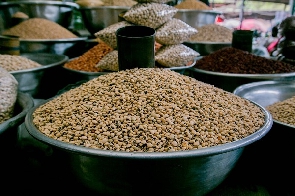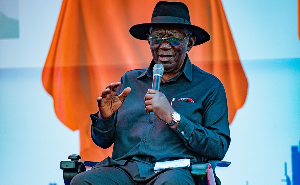I recently read an article titled; “The new colonialist food economy; how Bill Gates and agribusiness giants are throttling small farmers in Africa and the Global South” published on the portal of US-based magazine, The Nation, and subsequently on some African media platforms like myjoyonline.com. “Seeding disaster” was the headline when the article was published in the printed copy of the magazine.
Shrouded in the so-called Africa seed sovereignty campaign, the article in summary claims the development of improved seeds in Africa is a grand attempt by the Western world to hijack Africa’s food systems. Just as the passage of Plant Variety Protection legislation by parliaments in Africa, as we have seen in Ghana. The article was the product of a recent visit to Ghana by the author who is an American journalist.
But when I read the article, I felt the same way that I have felt reading several other African agriculture-related articles by Westerners who appear not to fully understand what’s happening on our continent. The article lacked the appropriate context of the realities African people find themselves in when you talk about food security and agribusinesses.
Of course, the author sprinkled quotes of Africans across the article, some of which are liaised with misrepresentations, that I will touch on later. But two things were either deliberately or inadvertently omitted, as is the case with several other such articles I have read. The first is that it is not only foreign companies that are developing improved seeds in Africa. Some African plant breeders and homegrown agribusinesses are doing that too. And secondly, the article glossed over the precarious hunger situation in Africa.
So first, let me put the African food security situation in the appropriate context. Africa is the hungriest continent in the world and the situation deserves peculiar attention. It's embarrassing to admit that as an African agriculturalist, but that is the hard truth. The State of Food Security and Nutrition in the World 2022 report put together by the Food and Agriculture Organization, United Nations International Children’s Emergency Fund (UNICEF), World Food Program, World Health Organization, and the International Fund for Agricultural Development, couldn’t have summed it up any better.
“One in five people in Africa (20.2 percent of the population) was facing hunger in 2021, compared to 9.1 percent in Asia, 8.6 percent in Latin America and the Caribbean, 5.8 percent in Oceania, and less than 2.5 percent in Northern America and Europe. Africa is also the region where the proportion of the population affected by hunger has increased the most,” the report said. Whilst 20 in every 100 people you meet in Africa faces hunger, in North America and Europe, the number is 2.5.
These are not just figures. I meet these people every day. From the subsistence farms in Damongo – Ghana to the malls in Nairobi – Kenya, to the coast of Mozambique. People are not getting 3 square meals a day, and the result is that they are dying of malnutrition, including children. This is happening everywhere in the world but the magnitude at which it is happening in Africa is nothing compared to the rest of the world.
It shouldn’t matter whether you are African or not. It shouldn’t matter whether you are a philanthropist seeking to throw your money around, an agribusiness CEO seeking profit, or a government official in the West who just wants to look good. We need all hands on deck to do something about this troubling hunger situation in Africa and Asia.
We Africans must also be ready to do something about the situation. Like incite local ingenuity and encourage homebred hunger-fighting initiatives, hold our leaders to account, and checkmate foreigners who come in to help. But this posturing that creates the impression that Africans working with foreigners to deal with food security challenges have no minds of their own to read between what is right or wrong for us, is nothing but insulting.
The Plant Variety Protection Act controversy:
Now to rebuff some of the specific claims in the article. I have a friend called Dr. Amos Rutherford Azinu. He is the founder of the Legacy Crop Improvement Center (LCIC), a private seed business firm located in the Eastern Region of Ghana. Early this year, his company introduced to the Ghanaian market a new yellow hybrid corn under the trade name LEGACY 26.
It’s unique because in a country where corn farms yield an average of 3 tonnes per hectare, Legacy 26 yields 8 tonnes per hectare. This high level of productivity didn’t come easy. It is the result of many years of breeding work and millions of investments.
Do you genuinely think it is out of place that Ghana’s Parliament 2020 passed the Plant Variety Protection Act to ensure unscrupulous people don’t steal LCIC’s intellectual property? Do you genuinely think if another plant breeder picks Legacy 26, improves upon it, and comes up with a variety that yields 16 tonnes per hectare, it will be out of place for LCIC to earn royalties from the newest variety? That will be the right thing to do and that’s what this law seeks to ensure. Not to criminalize the sharing of seeds by farmers.
Contrary to what the author of the article claims, this law is not part of any “new generation of agricultural reforms” that seeks to “institute legal and financial penalties throughout the African Union for farmers who fail to adopt foreign-engineered seeds protected by patents, including genetically modified versions of native seeds.”
This claim is a slap in the face of small business seed companies in Ghana like LCIC, which are struggling every day to improve the country’s food security. You are thrashing their work. And you are creating an impression that what they do, doesn’t matter.
I had the honor of sitting at the front row seat in the press gallery of Ghana’s parliament as the house debated this law whilst serving as parliamentary correspondent for Joy FM and Joy News TV. The lawmakers who debated and approved this law were very categorical that it does not criminalize the sharing of seeds by farmers. Ghana’s former Attorney General Gloria Akuffo in a memo to parliament stated that categorically.
She said; “The plant breeders right system permits the farmer to save and replant seed and provides them with the right to use protected varieties as a source of further research and breeding activities.” So, why is this still an issue many years later? I know why. Some conspiracy theorists don’t want the false claim to go away.
Below is what convinced me the most that the author is simply on a fear-mongering campaign. This is actually what Section 60 of the Plant Variety Protection Act says: “A person who wilfully (a) offers for sale, sells or markets the propagating material of a variety protected in Ghana; (b) markets propagating material of a variety protected in Ghana without the registered variety denomination; or (c) uses the registered variety denomination of a variety protected in Ghana for another variety of the same plant species or closely related species likely to confuse commits an offense and is liable on summary conviction to a fine… or a term of imprisonment of not less than ten years and not more than fifteen years.”
The law targets unscrupulous marketers, not farmers. For fear-mongering sake, the author quotes someone who in reading the act replaces “a person” with “a farmer who willfully commits an offense.” Nothing could be further from the truth.
The authors writes; ‘Was it possible, the farmers asked, that Ghanaian police could be empowered to imprison cowpea farmers for trading and refining “unregulated” native seed stocks?’ The answer is no. The Attorney General’s office has said so. And the author knows it.
The author says; “the tightening of intellectual property laws on farms throughout the African Union would represent a major victory for the global economic forces.” No. It will rather be a victory for local companies like LCIC so they can help develop better seeds for farmers. If global seed companies also end up benefiting, why not? But more importantly, the law doesn’t tighten intellectual property on African farms. It seeks to deter people from unfairly stealing the intellectual property of companies like LCIC.
In the absence of any protection, how would companies like LCIC grow to become global conglomerates like Bayer and Syngenta, for the benefit of African economies? LCIC is a member of the National Seed Trade Association of Ghana, an association of seed companies that has hundreds of members doing similarly great work to improve seeds in Ghana.
The claim by the author that protecting the seed businesses in Ghana is a “punitive model of food cultivation that aims to supplant farmer traditions and practices that have endured on the continent for millennia,” doesn’t add up. These Ghanaian seed companies are improving local seeds for the benefit of Ghanaian farmers.
Simplifying the argument:
Let me simplify the analogy being advocated by activists fighting Plant Variety Protection laws in Africa. Bottled water companies are making millions in sales all over the world. Can I argue that bottled water companies have no right to patent their products because the source water is from rivers and lakes which are God-given? If I want to go drink directly from the river, I will drink that free of charge. But if someone purifies it and bottles it for me, that person deserves to be paid for their investment.
We don’t have a problem when that is done with bottled water and even oxygen tanks in the USA and Africa. But when African businesses seek to protect their improved seed, that raises eyebrows. Farmers can continue using their seeds just as people who have the time can go fetch water directly from rivers and purify to drink. But just like people who prefer bottled water, farmers who want improved seeds from seed companies like LCIC must pay for it. And they are not even complaining because they see the returns on their investments.
Do these seed sovereignty campaigners wish Africa well?:
Another key point worth re-stating is that Legacy 26 yields almost 3 times better than the average maize seed varieties in Ghana. There are maize varieties in Ghana that yield as low as 1 tonne per hectare, which means Legacy 26 yields 8 times better than that. Is the author saying it is wrong for firms like LCIC to offer these improved seeds to Ghanaian farmers? Is the author insisting farmers should only grow the varieties that yield 80% less? Does the author wish Ghanaian farmers well, and does the author care about Africa feeding itself?
The GMO controversy:
Let me address the issue of GMOs in Africa by first pointing out that foreign involvement in Africa is not unique to the agricultural space. Every aspect of life in Africa, just as in other parts of the world, is awash with foreign involvement. There are foreign cars on our roads, foreign companies mining our gold, hospitals use foreign reagents and equipment, and almost all our revolutionary technologies like mobile phones and computers are foreign-made. There are even foreign coffin makers in Ghana, besides the lavish foreign coffins we import into the country.
Do we want that changed in Africa? Off course. Just as America is fighting the lost battle to replace all the Chinese and Mexican goods on the market with “Made in America” products. I call it a lost battle because we live in a globalized world where international trade is the norm and not the exception.
So yes, USAID, the Rockefeller Foundation, the Gates Foundation, Bayer, and other such institutions are heavily involved in Africa’s GMO space. Just as some are involved in initiatives to spread life-saving vaccines like COVID-19 vaccines across the continent. But there are Ghanaian scientists involved too like Dr. Jerry Nboyine of the Ghana government-funded Savanna Agricultural Research Institute (SARI), who currently leads the genetically modified cowpea project. He submitted the request for environmental release approval of Ghana’s first GMO - the GM cowpea, to the country’s National Biosafety Authority and got it.
If it ever becomes necessary to patent the GM cowpea variety, SARI and by extension the Ghana government will be the intellectual property owner. So, the impression being created that GMOs in Africa signal a hostile takeover of the continent’s seed sector by foreign interests is not backed by any evidence.
Let me round up on the GM cowpea bit with the point the author makes that Nigerian farmers claim “the taste of the GM cowpea is not as nice, and that it takes longer to boil and doesn’t stick together.” I respect the experiences of the farmers whose stories the author recounts. But I have also spoken to farmers in Nigeria and Ghana who say the only difference between the GM cowpea and conventional seeds is the reduced pest damage they see on the field, and not else. They are glad they don’t have to suffer pesticide poisoning, and they are glad they will be making savings by reducing the use of environmentally polluting pesticides.
Final words:
The author appears to shake the flag of agroecology as a possibly better choice for Africa than hybrids and GMOs. I have no problem with that. But what is wrong with agroecology being pursued, hand in hand with the use of hybrid seeds and GMOs? So farmers choose what works for them. Why do activists preach a limitation of the choices for farmers and tell them, to go agroecology but don’t use GMOs and hybrids? Won't allowing broad choices rather increase the chance of the farmer getting the best out of their toil? Why must one technological innovation necessarily be blocked in favor of the other? Why does a company developing GMO or hybrid have to be torn down before agroecological practices can thrive? Let's not do that to our African farmers. They will be the worse for it.
The author makes the argument that “Hybrid and GMO seeds are engineered to grow with optimal water and large quantities of synthetic fertilizer, which small-scale farmers don’t have and can’t afford.” What stops us from working to ensure these associated support schemes are made available to them so that instead of the African farmer making 3 tonnes of corn per hectare, he or she can make 22 tonnes per hectare like the farmer in Ohio? Improving productivity will not solve all the world’s food insecurity problems but it will go a very long way to reduce the hunger burden, especially in places like Africa.
It was nice to see the author write about how “Mesoamerican farmers bred the first maize cobs from a wild grass that grew thick in the river valleys of central Mexico,” thousands of years ago. That is the evidence that in this ever-changing world, nothing remains the same.
If activists then had resisted the improvement of those wild grasses, we wouldn’t have had maize as we have it today. Someone needs to improve upon the crops we have. And it is an ongoing process. Farmers did it then and are doing it today. There is nothing wrong with plant breeders, and even agribusinesses like LCIC, also joining the fray and improving crops.
The author calls out institutions like the Alliance for Science, Africa Agricultural Technology Foundation (AATF), and Alliance for a Green Revolution in Africa (AGRA) for mediating the involvement of foreigners in Africa’s agriculture. I have had the honor of working with these institutions, and so I think I have earned the status to pass my judgment on their work. The African men and women who lead these institutions are not irresponsible leaders.
The impression that they have made these institutions conveyor belts pushing foreign interests whilst throwing the future of African farmers under the bus doesn’t represent the true picture of the work they do. I have seen firsthand these institutions put crop-improving technologies and other tools in the hands of farmers, which have changed the lives of whole farming communities for the better.
Should the work of these institutions be scrutinized? Certainly yes. Can their operational practices be improved upon? Absolutely. But to create the impression that the work they do mainly aims at selling Africa to the West under a new form of colonialism, doesn’t represent the true picture.
Opinions of Tuesday, 17 October 2023
Columnist: Joseph Opoku Gakpo















